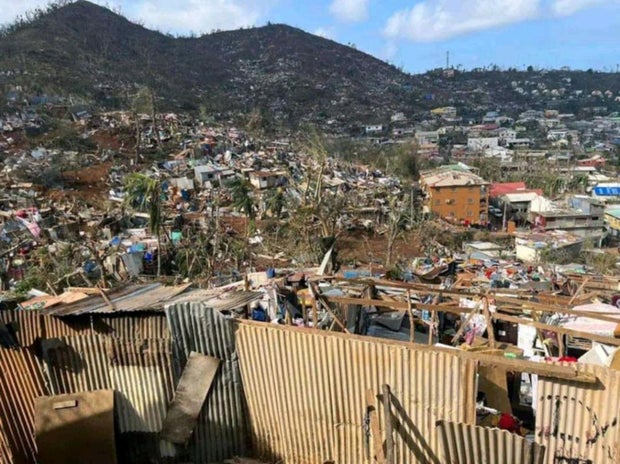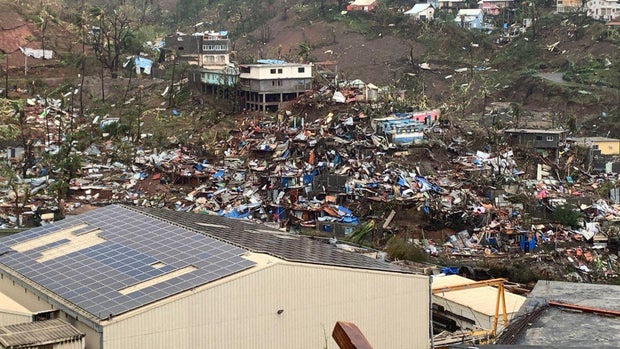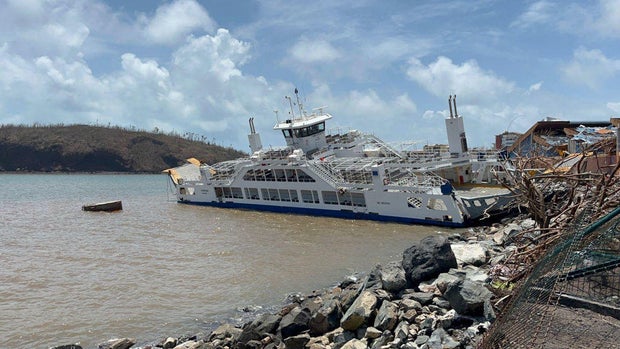
The death toll from Cyclone Chido in the French territory of Mayotte stands at “several hundred” and could number in the thousands, the island’s top government official told a local television channel on Sunday.
France has dispatched relief teams and equipment to its largely impoverished overseas department in the Indian Ocean, which has suffered widespread destruction.
“I think there are several hundred deaths, we will perhaps approach a thousand. Or even thousands… given the violence of this event,” declared the prefect of Mayotte, François-Xavier Bieuville, to the channel Mayotte the 1st.
He had previously declared that it was the worst cyclone to hit Mayotte in 90 years.
Bieuville said it was extremely difficult to obtain an exact number of deaths and injuries after Mayotte was hit by an intense tropical cyclone on Saturday, causing significant damage to public infrastructure, including the airport, destroying neighborhoods and cutting off the electricity supply.
The French Interior Ministry on Sunday confirmed at least 11 dead and more than 250 injured, but said the figure was expected to rise significantly.
DANIEL MOUHAMADI/AFP via Getty Images
Mayotte, located in the southwest Indian Ocean off the coast of Africa, is the poorest island in France and the poorest territory in the European Union. It has just over 300,000 inhabitants spread over two main islands.
Bieuville said the worst damage was seen in the slums of metal shacks and informal structures that characterize much of Mayotte. Referring to the official death toll so far, he said “this figure is not plausible when we see the images from the slums.”
“I think the human toll is much higher,” he added.
Chido blew through the southwest Indian Ocean on Friday and Saturday, also affecting the neighboring islands of Comoros and Madagascar. But Mayotte was directly in the path of the cyclone and paid the price. Chido brought winds in excess of 220 km/h (136 mph), according to the French meteorological service, making it a Category 4 cyclone, the second strongest on the scale.
Chido later made landfall in Mozambique on the African continent, and more than 2 million people in the country’s north were feared to be affected, according to local authorities.
French President Emmanuel Macron said his “thoughts” were with Mayotte and that Interior Minister Bruno Retailleau was due to visit Mayotte on Monday. Retailleau had warned on Saturday evening, after an emergency meeting in Paris, that the toll “will be high”, while the new Prime Minister François Bayrou, who took office on Friday, declared that the infrastructures had been seriously damaged. damaged or destroyed in Mayotte.
KWEZI/AFP via Getty Images
Pope Francis offered prayers for the victims during a visit Sunday to the French Mediterranean island of Corsica.
Rescuers and firefighters were sent from France and the neighboring French territory of Réunion, and supplies were also flown in on military planes and ships. Damage to the airport control tower prevented only military planes from flying there.
Patrice Latron, prefect of La Réunion, said authorities were considering establishing an air and sea bridge between La Réunion and Mayotte. About 800 additional rescuers were expected to be sent in the coming days and more than 80 tons of supplies have been flown in or are on their way by boat. Some of the priorities included restoring electricity and access to clean water, Latron said.
The French Interior Ministry said 1,600 police and gendarmes were deployed to “help the population and prevent possible looting.”
In parts of Mayotte, entire neighborhoods of shacks and metal shacks were razed, while residents reported trees uprooted, boats overturned or sunk and many areas without power.
Chad Youyou, a resident of Hamjago, in the north of the island, posted videos on Facebook showing the extensive damage in his village and in the surrounding fields and hills, where almost all the trees were razed.
“Mayotte is destroyed… we are destroyed,” he said.
KWEZI/AFP via Getty Images
Chido continued its trajectory east and into northern Mozambique, where it continued to cause severe damage, while further inland, Malawi and Zimbabwe warned they may need to evacuate their inhabitants due to flooding.
In Mozambique, UNICEF said the Cabo Delgado province, home to around 2 million people, was the first region affected and many homes, schools and health facilities were partially or completely destroyed.
UNICEF Mozambique spokesperson Guy Taylor said communities risked being cut off from schools and health facilities for weeks and Mozambican authorities warned there was a high risk of landslides of land.
December to March is cyclone season in the southwest Indian Ocean, and southern Africa has been hit by a series of severe cyclones in recent years. In 2019, Cyclone Idai killed more than 1,300 people, mainly in Mozambique, Malawi and Zimbabwe. Cyclone Freddy killed more than 1,000 people last year in several countries in the Indian Ocean and southern Africa.
Cyclones bring risks of flooding and landslides, but stagnant pools of water could also trigger deadly outbreaks of cholera, a water-borne disease, as well as dengue fever and malaria.
Studies indicate that cyclones are getting worse because of climate change. They may leave poor African countries, which contribute little to global warming, facing vast humanitarian crises, underscoring their call for more aid from rich countries to deal with the impact of climate change.





